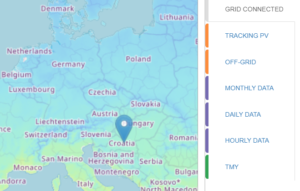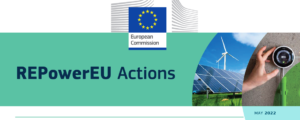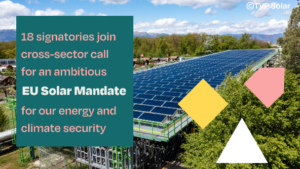European Council speeds up permission procedures but only for solar systems on buildings
February 2, 2023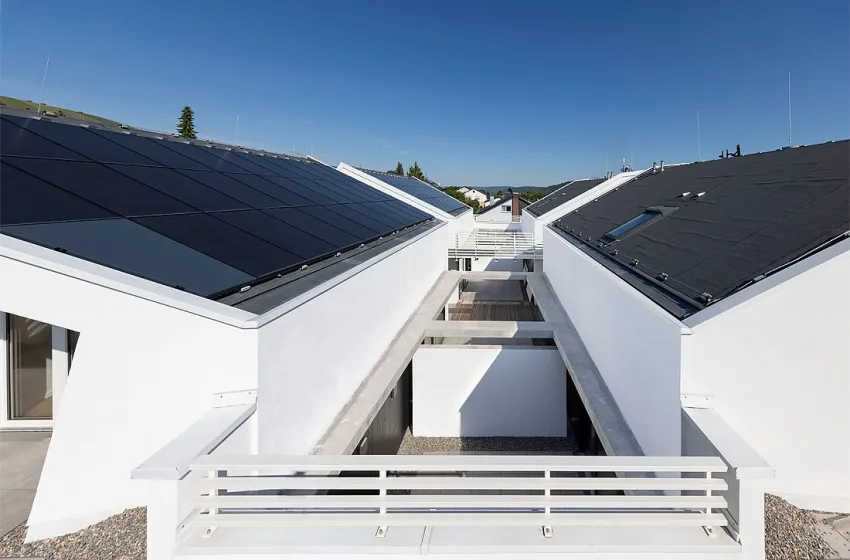
Following an EU Commission proposal, the Council of the European Union adopted its Council Regulation (EU) 2022/2577 on 19 December 2022 as a “framework to accelerate the deployment of renewable energy”. It came into force with its publication in the EU´s Official Journal on 29 December 2022. It obliges the EU Member States to speed up permission procedures not only for wind power plants but also for the installation of solar energy systems, whether photovoltaics, solar thermal or a combination of both (see document for download below). “We have already transposed the EU emergency regulation into German law in order to speed up approval procedures and expert assessments for a year and a half and become faster and more effective in a situation of energy crisis”, declared Germany’s Economics and Energy Minister Robert Habeck at the end of January 2023 on German television.
Photo: KOP GmbH
Council Regulation 2022/2577 is considered as a reaction to Russia’s war of aggression against Ukraine, which created a situation with exorbitantly rising energy prices, not only reducing the purchasing power of the EU population but also weakening the competitiveness of European companies. The emergency measure will reduce dependence on Russian fossil fuels according to the REPowerEU plan and help to implement the European Green Deal approved in 2020, which aims to de-carbonize the EU economy and achieve climate neutrality by the year 2050.
In Germany the acceleration effect will be limited
After the Solar Energy Strategy and the go-to-areas concept, the new regulation is the third EU Commission initiative to accelerate the use of renewable energy sources in less than one year. How do solar thermal association representatives assess this rapid sequence of new proposals and regulations? In response to our inquiry, Ute Swart from the German Solar Industry Association BSW Solar praised the “EU emergency regulation”. According to her “it pulls some measures forward that were foreseen as parts of the planned reform of the European Renewable Energies Directive (RED IV)”.
However, for Germany its acceleration effects will be limited, she expects, “as it only targets approval procedures for solar installations on artificial structures, not for ground-mounted installations. But in Germany installations of solar systems on buildings are already exempt from approval”. So Swart expects the regulation to have only limited impact, since it only applies, for example, to “special buildings or structural facilities such as landfills, where a permit procedure is still required for the installation of a solar system”.
Accelerate permit-granting procedures for solar energy on artificial structures
The regulation names as an example local energy communities as one possibility for a fast roll-out of renewable energy installations, aiming at the deployment of small-scale solar installations for (collective) own consumption. This is also limited to “solar energy equipment on artificial structures”. The proposal introduces “a maximum deadline of one month for the permit-granting process for the installation of solar energy equipment and its related co-located storage and grid connection”. For solar PV and solar thermal systems with a capacity of 50 kW or less, the lack of a reply from the relevant authorities within one month following the application will result in the permit being considered as granted.
As Swart explained, the Solar Strategy and the go-to-areas concept have not yet had any real impact as they are yet to be discussed in the context of the planned RED IV amendment and still need to be fixed in law. The European solar obligation and support for the solar industry in expanding production capacities have also not yet been discussed.
In the area of district heating, the BSW considers the introduction of a minimum RE quota to be urgent. It also thinks it is important to make suitable sites close to residential areas available for large solar thermal plants in heating networks. Privileges under building law in outdoor areas should be given so that solar thermal systems can be realised more quickly and in greater numbers. “This could lead to noticeable market growth in this segment. But as so often, it depends on the implementation of the regulation at the national level.”
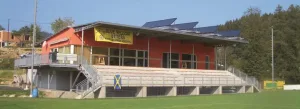
EU plans roll-out of solar thermal systems installed on buildings for own consumption
Photo: Tisun
“Permission procedures are a bottle neck and a real burden in terms of money and time”, says Costas Travasaros, co-owner of the Greek company Prime Laser Tec (PLT) and President of Solar Heat Europe (SHE). He thinks the new regulation can “certainly Speed up the deployment of solar thermal collectors, especially in households. This will in turn benefit solar thermal manufacturers and raise awareness of the advantages of solar thermal”. The efficiency of solar systems in meeting low temperature heat needs is “far higher than a heat pump or PV for the same purpose and should thus be prioritised”, Travasaros said. This is why he proposes that “regulations should prefer solar thermal for space
heating and heat in industry parallel to heat pumps”.
Travasaros also sees go-to-areas in urban contexts as crucial to the decarbonisation of heating and cooling. “On the one hand, renewable heating and cooling plants must be located close to end-users. On the other hand, it is generally more complicated and expensive to find available land in urban centres”, he said, describing the dilemma, and stated that priority areas within or close to cities dedicated to large scale renewable heating and cooling plants are the key to sustainable urban development.
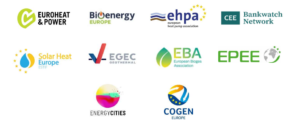
Signatories of the 10-Point Plan to Accelerate the EU Heat Transition Source: Solar Heat Europe
Giulia Artibani, Director of Communications at Euroheat & Power (EHP), finds the new regulation a good initiative, like the Solar Strategy and the go-to-areas concept. Although the latter “are mostly tailored to clean electricity rather than clean heat sources”. According to her, they avoid the specificity of heat network investments and “don’t mitigate the high financial risks related to infrastructure development”. She pointed out that EHP has “long advocated a specific European framework to fill those gaps and accelerate the clean heat transition. The potential of solar thermal to supply municipalities and businesses with clean heat is enormous and largely untapped“.
In October 2022, Euroheat & Power and Solar Heat Europe co-signed their “10-Point Plan to Accelerate the EU Heat Transition” (see pdf for download below). Among its recommendations are “the immediate implementation of mandatory heat planning assessment in EU cities above 30,000 citizens and a ban on fossil-only individual boilers in buildings as well as the implementation of carbon pricing across the heating and cooling sector”.
Artibani also stressed the necessity of economic and regulatory incentives for flexible balancing solutions like thermal storage which are “a hundred times cheaper than battery storage, would benefit flexibility and grid stability and support the roll-out of solar thermal heating and cooling”. Furthermore, she demanded “de-risking instruments and investment aid for smaller local projects because so far financing has focused a lot on large-scale projects“.
Organisations mentioned in this news article:
BSW Solar: https://www.solarwirtschaft.de/en/home/
Prime Laswer Tech: https://primelasertech.gr/en/
Solar Heat Europe: http://solarheateurope.eu/
KOP GmbH: http://www.kop.info/
Euro Heat & Power: https://www.euroheat.org/
